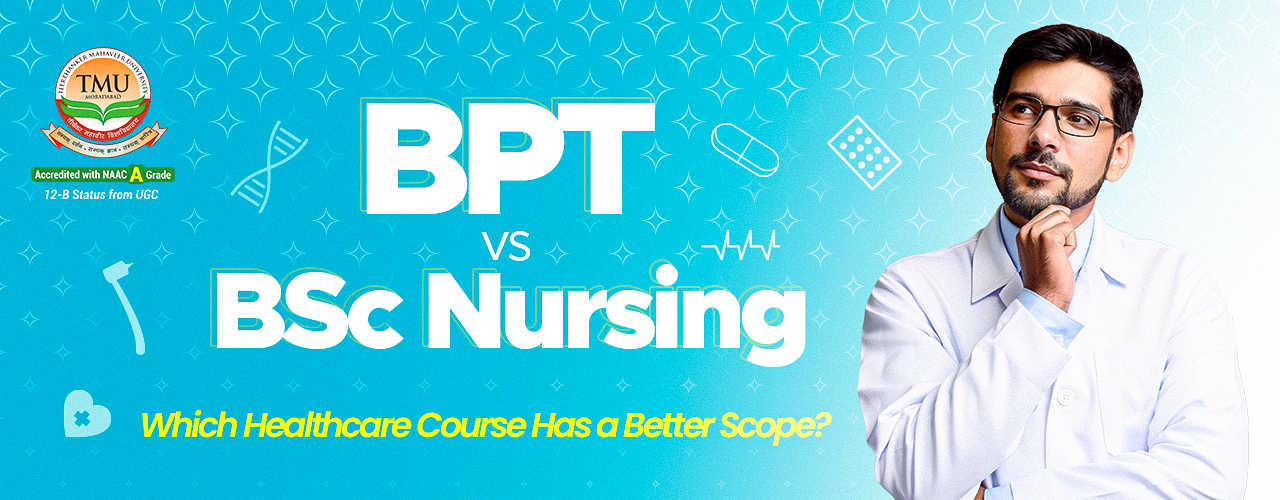BPT vs BSc Nursing: Which Healthcare Course Has a Better Scope?
Table of Contents
Choosing a healthcare career isn’t just about wearing a white coat or saving lives. It’s a commitment to learning, compassion, and a lifetime of impact. Among the most sought-after undergraduate programs in the healthcare sector are BPT (Bachelor of Physiotherapy) and BSc Nursing. While both lead to meaningful careers, they offer different paths, challenges, and scopes.
In today’s competitive world, students often find themselves at a crossroads trying to decide between these two. Each course has its flavour—BPT is more rehabilitation-focused, while BSc Nursing leans towards patient care and clinical support. This article aims to break down every aspect of these programs to help you decide which one aligns best with your passion and career vision.
If you're trying to figure out which field to pursue, stay tuned—we're diving deep into the details.
Understanding BPT and BSc Nursing
What is BPT (Bachelor of Physiotherapy)?
Bachelor of Physiotherapy (BPT) is a 4.5-year undergraduate program designed to prepare students for a career in physical rehabilitation and therapy. It focuses on teaching students how to assess, diagnose, and treat patients suffering from physical disabilities, movement disorders, or injuries.
Physiotherapists play a crucial role in post-surgery recovery, sports injuries, arthritis treatment, and neurological rehabilitation. Unlike nurses, who often work alongside doctors in providing bedside care, physiotherapists work more independently, crafting personalised recovery plans and tracking a patient’s physical progress.
A BPT graduate is trained to:
- Use physical exercises, electrotherapy, and manual therapy to treat patients
- Develop custom treatment plans
- Collaborate with orthopaedic doctors, neurologists, and sports medicine specialists
- Improve patients' mobility and quality of life
BPT is a perfect fit for someone interested in movement science, physical fitness, and one-on-one patient interaction.
Teerthanker Mahaveer University
Apply for Admission
Click Here To Apply for Admission
What is BSc Nursing?
BSc Nursing is a 4-year undergraduate course focused on preparing students for professional nursing practice. Nurses are the backbone of the healthcare system. They provide round-the-clock care, monitor patient health, assist in surgeries, and support patients both physically and emotionally.
The course trains students in:
- Human anatomy and physiology
- Clinical procedures
- Patient care and bedside manners
- Emergency response
- Drug administration
- Ethical and legal aspects of healthcare
BSc Nursing graduates work closely with doctors and patients in a variety of settings, including hospitals, clinics, schools, and even NGOs. Nursing requires strong communication skills, emotional resilience, and the ability to handle stressful situations with calm and compassion.
If you're deeply empathetic, detail-oriented, and thrive in high-pressure environments, BSc Nursing might be your calling.
Course Duration and Eligibility
Duration of BPT and BSc Nursing Programs
Both BPT and BSc Nursing are full-time undergraduate programs, but their durations differ slightly:
- BPT: 4.5 years (4 years of academic study + 6 months of compulsory clinical internship)
- BSc Nursing: 4 years (including classroom teaching and extensive clinical training)
Both courses integrate theory and practical sessions; BPT leans more towards physical rehabilitation, whereas nursing emphasises patient care and medical support.
Eligibility Criteria for Admission
Let’s face it—getting into a good college is the first big step. Here’s how you can qualify for each:
BPT Eligibility:
- 10+2 with Physics, Chemistry, and Biology (minimum 50% aggregate)
- Entrance exams may be required depending on the university (e.g., NEET, CET, or specific college-level exams)
BSc Nursing Eligibility:
- 10+2 with Physics, Chemistry, and Biology + English (minimum 45-50%)
- Age: 17 years minimum
- Entrance exams are conducted by universities or state-level boards
Although the eligibility requirements are similar, nursing programs may place more emphasis on communication and soft skills due to the patient-facing nature of the profession.
Curriculum Comparison
Subjects Covered in BPT
The BPT syllabus is a deep dive into the science of human movement. Key subjects include:
- Anatomy & Physiology
- Biomechanics
- Pathology
- Pharmacology
- Exercise Therapy
- Electrotherapy
- Orthopaedics and Neurology
- Physiotherapy in Cardio, Neuro, and Orthopaedic conditions
- Rehabilitation Techniques
The curriculum is practice-heavy with significant hands-on lab sessions and patient interaction during clinical postings. It also incorporates case studies, presentations, and real-world problem-solving to prepare students for practical scenarios.
Subjects Covered in BSc Nursing
BSc Nursing is a robust programme combining medical knowledge with nursing practice. Core subjects are:
- Anatomy & Physiology
- Nutrition & Biochemistry
- Microbiology
- Psychology
- Medical-Surgical Nursing
- Pediatric Nursing
- Psychiatric Nursing
- Community Health Nursing
- Obstetrics & Gynaecology Nursing
- Nursing Research & Statistics
From IV drips to emergencies, students are trained in diverse environments, including ICUs, maternity wards, and rural health centres. Emphasis is also placed on ethics, communication, and teamwork.
Practical Training and Internships
Both BPT and BSc Nursing programs include rigorous practical training, but they differ in approach:
- BPT Internships involve physiotherapy clinics, hospitals, and sports rehab centres where students actively assist in treatment plans, learn to operate equipment, and handle real patients with mobility issues.
- BSc Nursing Internships are done in hospital settings where students rotate across departments, learning tasks like administering medications, handling emergencies, assisting doctors in surgeries, and providing holistic care.
Hands-on experience is the backbone of both fields. However, while BPT students specialise in therapy and rehabilitation, nursing students become all-rounders in clinical care.
Skills Acquired in Both Courses
Clinical and Soft Skills in BPT
In BPT, students are not only moulded into competent healthcare professionals but also nurtured to develop vital interpersonal and observational skills. Physiotherapists work directly with patients for prolonged periods, making communication and patience crucial traits. Here’s what a BPT student masters:
- Clinical Knowledge: Thorough understanding of anatomy, neurology, and musculoskeletal systems
- Technical Proficiency: Use of therapeutic equipment like ultrasound, TENS, traction machines, and more
- Analytical Thinking: Ability to assess a patient's physical condition, design customised exercise regimens, and track progress
- Hands-on Skills: Manual therapy, mobilisation techniques, and postural training
- Empathy and Patience: Dealing with long-term patients or those recovering from trauma requires emotional intelligence
- Time Management: Managing multiple patients, appointments, and documentation
These professionals become physical health coaches, often establishing a bond with their patients over extended treatment periods, which makes their soft skills as important as their medical ones.
Critical Thinking and Patient Care Skills in Nursing
Nurses are on the frontline of healthcare. Their skillset extends beyond the technical to include an unwavering emotional strength and sharp critical thinking. BSc Nursing students develop:
- Clinical Accuracy: Ability to take vital signs, administer medications, and respond to emergencies swiftly
- Communication: Listening actively to patients, explaining procedures, and coordinating with doctors
- Empathy and Compassion: Offering comfort to patients and families in distress
- Critical Decision-Making: Nurses must often make urgent decisions regarding patient care in high-pressure situations
- Organisation: Keeping track of multiple patient records, medication timings, and shift schedules
- Leadership: Taking charge in wards, managing junior staff or interns, and guiding patient care plans
Nursing isn’t just a job—it’s a calling. The skills acquired make nurses one of the most valuable and respected professionals in healthcare.
Career Opportunities After Graduation
Job Roles for BPT Graduates
BPT graduates find ample career paths in various settings. Whether it’s working in sports, rehabilitation centres, or corporate wellness programmes, opportunities are wide and growing.
Common Job Titles:
- Physiotherapist
- Sports Therapist
- Rehab Specialist
- Geriatric Physiotherapist
- Pediatric Physiotherapist
- Neurophysiotherapist
- Consultant Physiotherapist in private clinics
Employment Areas:
- Hospitals
- Sports academies
- Wellness and fitness centres
- NGOs and community healthcare
- Private practice and home care settings
With rising awareness about non-invasive treatments and recovery-based therapies, physiotherapy is becoming a go-to choice for many patients post-surgery or injury. The profession also offers opportunities to work abroad, where demand is even higher.
Job Roles for BSc Nursing Graduates
BSc Nursing graduates enjoy strong job security and versatile work roles. From ICU care to public health education, nurses are required everywhere healthcare is delivered.
Common Job Titles:
- Registered Nurse (RN)
- ICU Nurse
- Surgical Assistant Nurse
- Pediatric Nurse
- Emergency Room (ER) Nurse
- Nurse Educator
- Public Health Nurse
Employment Areas:
- Government and private hospitals
- Military and defence services
- Schools and educational institutions
- Community health programs
- International healthcare systems (UK, Canada, Middle East)
Nursing offers one of the fastest entry-to-employment transitions in healthcare. With ongoing shortages of trained nurses globally, BSc Nursing grads find it relatively easy to secure a job, often before graduation.
Work Settings: Clinics, Hospitals, and Beyond
Both BPT and BSc Nursing professionals can work across various sectors. However, their work settings slightly differ:
| Aspect | BPT Graduates | BSc Nursing Graduates |
| Main Work Environment | Physiotherapy Clinics, Sports Facilities | Hospitals, ICUs, Emergency Rooms |
| Independent Practice | Common: Many start their clinics | Rare; Usually work as part of a team |
| Home Care Opportunities | High, especially in senior care and post-surgery | Moderate, depending on patient needs |
| International Scope | High in countries like Canada, Australia | Very high in the US, UK, Middle East |
Physiotherapists often enjoy more independence and flexible work schedules, while nurses benefit from structured, stable roles with defined responsibilities.
Salary Prospects
Starting Salary Comparison
When it comes to starting salaries, both fields offer decent entry points, but nursing tends to be slightly ahead in the public sector, especially in government hospitals or abroad.
| Course | Average Starting Salary (INR/Month) |
| BPT | ₹20,000 – ₹30,000 |
| BSc Nursing | ₹25,000 – ₹35,000 |
Private hospitals may pay less initially, but salaries grow with experience. Physiotherapists with their practice or those in sports rehabilitation often earn significantly more within a few years.
Growth and Promotions
In terms of career growth:
BPT Graduates:
- Can open their clinic
- Specialise in sports therapy, neurology, or orthopaedics
- Move into teaching or research
- Work abroad with certifications
BSc Nursing Graduates:
- Can become Senior Nurses, Nurse Supervisors, or Nurse Practitioners
- Pursue M.Sc. Nursing for academic or teaching careers
- Appear for public sector exams (AIIMS, ESIC, Railways)
- Easily migrate to international roles with required exams (NCLEX, HAAD)
While both fields offer room for growth, nursing tends to have more structured promotion paths in both the public and private sectors.
Further Education and Specialisations
Postgraduate Options for BPT
After BPT, students can specialise in:
- MPT (Master of Physiotherapy) in areas like Orthopaedics, Neurology, Cardio-Respiratory, and Sports
- MBA in Healthcare Management or Hospital Administration
- Certification courses in Manual Therapy, Dry Needling, Ergonomics, etc.
Specialisation greatly enhances employability and allows physiotherapists to charge higher consultation fees.
Postgraduate Options for BSc Nursing
BSc Nursing graduates can pursue:
- MSc Nursing with specialisations in Psychiatry, Pediatrics, Community Health, etc.
- Post Basic BSc Nursing (for diploma holders)
- PhD in Nursing
- Management or Hospital Administration degrees
- International licensing exams (NCLEX, CRNE)
Postgraduate nursing programs also open doors to administrative and teaching positions, further expanding their career scope.
Industry Demand and Job Market Trends
Demand for Physiotherapists
The healthcare sector is rapidly evolving, and with it, the demand for physiotherapists is climbing. With increasing cases of orthopedic injuries, lifestyle-related ailments, neurological disorders, and post-surgery rehabilitation needs, BPT graduates are finding more opportunities than ever before.
Key trends fuelling the demand for physiotherapists include:
- Ageing Population: Elderly patients require regular physical therapy for mobility and pain management.
- Sedentary Lifestyles: Office jobs and a lack of physical activity have led to a surge in musculoskeletal problems.
- Sports Industry Growth: Athletes and fitness centres are constantly in need of sports physiotherapists.
- Preventive Healthcare: There's a rising awareness of preventive care and holistic wellness, encouraging people to seek physiotherapy early.
Moreover, developing countries like India are seeing a boom in rehabilitation centres and private physiotherapy clinics. Internationally, countries like Canada, Australia, and the UK have declared physiotherapy a high-demand occupation, offering BPT graduates better immigration and job prospects.
Demand for Nurses
If there's one profession that's consistently in demand across the globe, it’s nursing. Nurses are indispensable to healthcare systems, often acting as the first and last point of contact for patients. The global shortage of trained nurses, especially after the COVID-19 pandemic, has made BSc Nursing one of the most employable degrees in the world.
What’s driving the demand?
- Chronic Disease Management: Conditions like diabetes, hypertension, and cancer require long-term nursing care.
- Expanding Healthcare Access: Rural healthcare missions and new hospital chains are expanding into tier-2 and tier-3 cities.
- Global Nursing Crisis: Countries like the US, UK, Australia, and Gulf nations have thousands of open nursing positions.
- Mental Health Awareness: Psychiatric nurses are in demand to support the rising mental health crisis.
- Evolving Roles: Nurses are now being trained for advanced roles such as nurse practitioners, midwives, and clinical specialists.
With the push towards quality healthcare, the nursing profession continues to shine as a secure, respected, and growth-orientated career.
BPT vs BSc Nursing: Side-by-Side Comparison Table
| Criteria | BPT | BSc Nursing |
| Full Form | Bachelor of Physiotherapy | Bachelor of Science in Nursing |
| Duration | 4.5 years (includes 6-month internship) | 4 years |
| Eligibility | 10+2 with PCB (50%) | 10+2 with PCB and English (45-50%) |
| Core Focus | Physical rehabilitation and therapy | Clinical patient care and health support |
| Workplace | Clinics, sports centers, rehab facilities | Hospitals, ICUs, community health centers |
| Average Starting Salary | ₹20,000 – ₹30,000/month | ₹25,000 – ₹35,000/month |
| Top Career Options | Physiotherapist, Sports Therapist, MPT | Staff Nurse, ICU Nurse, Nurse Educator |
| Demand Abroad | High (Australia, Canada, UK) | Very High (US, UK, Gulf, Canada) |
| Further Studies | MPT, MBA Healthcare | MSc Nursing, PhD, NCLEX |
| Independent Practice | Highly feasible | Limited to supervisory roles |
| Emotional Resilience Needed | Moderate | Very High |
This table makes it easier to visually compare the strengths and career directions of both programs. Your choice should depend on your passion, personality, and career aspirations.
Advantages and Disadvantages
Pros and Cons of BPT
Pros:
- Opportunity to work independently
- Strong demand in the wellness and sports sectors
- Physically engaging and rewarding career
- Flexible work hours
- Rising scope abroad
Cons:
- Physically demanding job
- Slower career start without specialisation
- May need to build a reputation before earning well
- Fewer government job options compared to nursing
BPT is ideal for those passionate about fitness, rehabilitation, and personalised patient interaction. It’s a growing field, but it may require more entrepreneurial initiative.
Pros and Cons of BSc Nursing
Pros:
- Strong job security and a structured career path
- Immediate employment after graduation
- High demand worldwide, especially in government sectors
- Emotional satisfaction from caring roles
- Scope for higher studies and promotions
Cons:
- High stress and irregular shifts
- Emotionally draining work, especially in ICUs and emergencies
- Limited independence; mostly works under physician supervision
- Requires strong mental stamina and compassion
Nursing is suited for those who thrive in team-based settings, are emotionally resilient, and find purpose in caregiving. It’s a globally respected profession with endless opportunities.
Which Course is Best for You?
Based on Interests and Strengths
Still confused? Here’s a simplified guide:
- Choose BPT if:
- You enjoy anatomy, movement science, and physical fitness
- You prefer working in rehabilitation settings
- You like one-on-one interactions with patients
- You want to open your clinic someday
- Choose BSc Nursing if:
- You’re emotionally strong and empathetic
- You want a stable job with early placements
- You’re okay with structured roles in a hospital
- You have dreams of working abroad quickly
Understanding your strengths and temperament is crucial. If you love hands-on work but also need job stability, nursing might be better. BPT might be the way to go if you're an entrepreneur, interested in fitness, and seeking a role that allows you some degree of independence.
Based on Career Goals
Let’s consider long-term goals:
- For Government Jobs: Nursing has the edge due to competitive exams and reserved positions.
- For International Careers: Both offer great scope, but nursing has a faster path with clear licensing exams like the NCLEX.
- For Private Practice: BPT stands out—many open their own therapy centres.
- For Teaching and Research: Both courses offer PG degrees and PhDs, leading to academic roles.
There is no universal solution here. It’s about what excites you, what kind of work you want to do daily, and what lifestyle you envision.
Conclusion
In the great debate of BPT vs BSc Nursing, both courses come out as champions in their own right. They cater to different strengths, personalities, and career dreams. While BPT offers more autonomy and caters to the booming wellness and rehabilitation market, BSc Nursing stands out for its structured career path, emotional fulfilment, and global demand.
The best path for you is the one that matches your values, passions, and future goals. Don’t just look at salaries or job titles—think about the kind of work that will keep you fulfilled, motivated, and proud every single day.
FAQs
Q1: Which is Best: Nursing or Physiotherapy?
Ans: It depends on your interests and career goals. Nursing is ideal if you’re compassionate, want job stability, and prefer working in hospitals or public health. It offers strong global demand, early job placements, and government job options.
Physiotherapy is better if you’re interested in fitness, rehabilitation, and prefer working independently or in sports/wellness settings. It offers flexibility, private practice opportunities, and growing demand, especially abroad.
Verdict:
- Choose Nursing for job security and global placement.
- Choose Physiotherapy for independence and growth in rehabilitation.
Q2: Which is more difficult: BPT or BSc Nursing?
Ans: Both courses are rigorous, but nursing is emotionally and mentally more taxing due to the nature of patient care, night shifts, and emergencies. BPT is physically demanding and requires strong technical understanding.
Q3: Can a BPT graduate work in a hospital?
Ans: Yes, BPT graduates can work in hospitals, especially in rehabilitation wards, orthopaedic departments, or post-operative care units.
Q4: Is a BSc in Nursing good for a government job?
Ans: Absolutely. BSc Nursing offers excellent opportunities in government hospitals, military services, and public health departments through entrance exams and direct recruitment.
Q5: Which has a better salary: BPT or BSc Nursing?
Ans: Nursing usually has a higher starting salary, especially in government sectors. However, BPT professionals can earn more over time if they specialise or open private clinics.
Q6: Can I switch from BSc Nursing to BPT or vice versa?
Ans: No, both are separate professional degrees with distinct curricula. Switching would necessitate a fresh start. However, both offer parallel options in healthcare if you wish to explore different paths after graduation.















